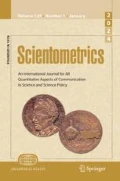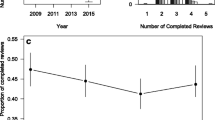Abstract
Peer review is fundamental to science as we know it, but is also a source of delay in getting discoveries communicated to the world. Researchers have investigated the effectiveness and bias of various forms of peer review, but little attention has been paid to the relationships among journal reputation, rejection rate, number of submissions received and time from submission to acceptance. In 22 ecology/interdisciplinary journals for which data could be retrieved, higher impact factor is positively associated with the number of submissions. However, higher impact factor journals tend to be significantly quicker in moving from submission to acceptance so that journals which receive more submissions are not those which take longer to get them through the peer review and revision processes. Rejection rates are remarkably high throughout the journals analyzed, but tend to increase with increasing impact factor and with number of submissions. Plausible causes and consequences of these relationships for journals, authors and peer reviewers are discussed.



Similar content being viewed by others
References
Aarssen, L. W., Tregenza, T., Budden, A. E., Lortie, C. J., Koricheva, J., & Leimu, R. (2008). Bang for your buck: Rejection rates and impact factors in ecological journals. Open Ecology Journal, 1, 14–19.
Abt, H. A. (1992). Publication practices in various sciences. Scientometrics, 24, 441–447.
Anonymous. (2008). Reducing the costs of peer review. Nature Neuroscience, 11, 375.
Benos, D. J., et al. (2007). The ups and downs of peer review. Advances in Physiology Education, 31, 145–152.
Brumback, R. A. (2009). Impact factor wars: Episode V—the empire strikes back. Journal of Child Neurology, 24, 260–262.
Casadevall, A., & Fang, G. C. (2009). Is peer review censorship? Infection and Immunity, 77, 1273–1274.
Cassey, P., & Blackburn, T. M. (2003). Publication rejection among ecologists. Trends in Ecology & Evolution, 18, 375–376.
Davidoff, F. (1998). Masking, blinding, and peer review: The blind leading the blinded. Annals of Internal Medicine, 128, 66–68.
Eisenhart, M. (2002). The paradox of peer review: Admitting too much or allowing too little? Research and Science Education, 32, 241–255.
Fisher, R. S., & Powers, L. E. (2004). Peer-reviewed publication: A view from inside. Epilepsia, 45, 889–894.
Garfield, E. (2006). The history and meaning of the journal impact factor. Journal of the American Medical Association, 295, 90–93.
Graber, M., Waelde, K., & Launov, A. (2008). Publish or perish? The increasing importance of publications for prospective economics professors in Austria, Germany and Switzerland. German Economic Review, 9, 457–472.
Hauser, M., & Fehr, E. (2007). An incentive solution to the peer review problem. PLoS Biology, 5, e107.
Hochberg, M. E., Chase, J. M., Gotelli, N. J., Hastings, A., & Naeem, S. (2009). The tragedy of the reviewer commons. Ecology Letters, 12, 2–4.
Hoppin, F. G. (2002). How I review an original scientific article. American Journal of Respiratory and Critical Care Medicine, 166, 1019–1023.
Lawrence, P. A. (2003). The politics of publication. Nature, 422, 259–261.
Linton, J. D. (2009). Reviewing: the unsung heroes of excellent journals and publications. Technovation, 29, 1–4.
Lortie, C. J., Aarssen, L. W., Budden, A. E., Koricheva, J. K., Leimu, R., & Tregenza, T. (2007). Publication bias and merit in ecology. Oikos, 116, 1247–1253.
Neff, B. D., & Olden, J. D. (2006). Is peer review a game of chance? BioScience, 56, 333–340.
Pitkin, R. M., & Burmeister, L. F. (2002). Prodding tardy reviewers: a randomized comparison of telephone, fax, and e-mail. Journal of the American Medical Association, 287, 2794–2795.
Smith, A. J. (1990). The task of the referee. IEEE Computer, 23, 46–51.
Tobin, M. J. (2002). Rigor of peer review and the standing of a journal. American Journal of Respiratory and Critical Care Medicine, 166, 1013–1014.
Weaire, D. (2007). Time for a rethink of research proposal evaluation? European Review, 15, 275–282.
Acknowledgements
Many thanks to R. Brown, D. Currie, D. Fontaneto, K. Gaston, O. Holdenrieder, M. Jeger, S. Shanmuganathan, R. Smith for data, support, insight or discussion, and to H. Abt, D. Liggins, T. Matoni, M. McPeek, S. Silver and anonymous reviewers for helpful comments on a previous draft.
Author information
Authors and Affiliations
Corresponding author
Rights and permissions
About this article
Cite this article
Pautasso, M., Schäfer, H. Peer review delay and selectivity in ecology journals. Scientometrics 84, 307–315 (2010). https://doi.org/10.1007/s11192-009-0105-z
Received:
Published:
Issue Date:
DOI: https://doi.org/10.1007/s11192-009-0105-z




